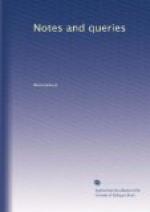OUR PROGRESS
Although very unwilling to encroach upon the enlarged space which we have this week afforded to our numerous and increasing contributors, we may be permitted to refer to the fact of our having felt it due to them to find such additional space by giving an extra half-sheet, as a proof at once of the growing interest in our Journal, and of its extended utility.
We trust too that the step which we have thus taken will be received as a pledge of our intention to meet all the requirements which may arise from our Journal becoming more generally known, and consequently, as we are justified by our past experience in saying, being made greater use of, as a medium of intercommunication between all classes of students and men of letters.
Our last and present Number furnish proofs of its utility in a way which when it was originally projected could scarcely have been contemplated. We allude to its being made the channel through which intending editors may announce the works on which they are engaged, and invite the co-operation of their literary brethren. Nor is the readiness with which such co-operation is likely to be afforded, the only good result to be obtained by such an announcement. For such an intimation is calculated not only to prevent the unpleasantness likely to arise from a collision of interests—but also to prevent a literary man either setting to himself an unprofitable task or wasting his time and research upon ground which is already occupied.
One word more. When we commenced our labours we were warned by more than one friendly voice, that, although we should probably find no lack of Queries, we should oftentimes be “straited for a Reply.” This, however, as our readers will admit, has not been the case; for though, as Shakspeare says, with that truth and wisdom for which he is proverbial—
“The ample proposition that Hope
makes,
In all designs begun on earth below,
Fails in its promis’d largeness,”
the observation in our Introduction, that “those who are best informed are generally most ready to communicate knowledge, and to confess ignorance, to feel the value of such a work as we are attempting, and to understand that if it is to be well done {290} they must help to do it,” has, thanks to the kind assistance of our friends, grown, from a mere statement of opinion, to the dignity of a prediction. We undertook our task in faith and hope, determined to do our best to realize the intentions we had proposed to ourselves, and encouraged by the feeling that if we did so labour, our exertions would not be in vain, for—
“What poor duty cannot do,
Noble respect takes it in might
not merit.”
And the success with which our efforts have been crowned shows we were justified in so doing. And so, gentle reader, to the banquet of dainty delights which is here spread before you!




